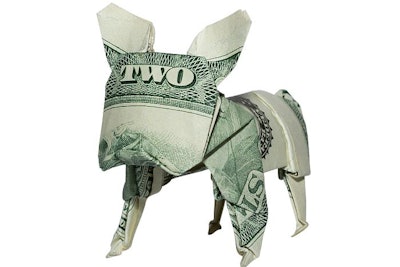
Recent trade deals may bolster U.S. pet food exports to two top markets, Canada and Mexico, and smooth the path for Chinese importation of U.S. pet foods. Together, the trade deals may presage a strong year for pet food commerce among the nations.
Signed into law on January 29, the U.S. Mexico Canada Trade Agreement (USMCA) placed no tariffs on pet food among the trading partners, just like its predecessor the North American Free Trade Agreement (NAFTA). Canada imported the most U.S. dog and cat food in 2019, according to American Feed Industry Association preliminary estimates, at 320,000 metric tons (MT). U.S. pet food exports to Mexico reached 45,000 MT in 2019, making Mexico the third largest importer.
“Trilateral pet food trade under NAFTA totaled around US$1 billion last year, including US$740 million in U.S. pet food exports to Canada and Mexico,“ Peter Tabor, Pet Food Institute vice president of regulatory and international affairs, said. “USMCA ensures tariff-free access for pet food trade among the USMCA parties. It also provides access to trilateral technical that can be used to address non-tariff barriers should they arise.”
US pet food in trade deal with China
The Phase One trade agreement between the U.S. and China went into effect February 14. The agreement lifted a ban on ruminant ingredients and an accompanying requirement for polymerase chain reaction (PCR) testing of them. The deal removed a ban on products with poultry ingredients. It may also reduce registration delays for pet food facilities in China. However, China maintains its tariffs of 29-39% on U.S. pet foods, and product registration complexities remain.
“The Phase One agreement includes provisions that do away with unscientific Chinese restrictions on beef and poultry origin ingredients, country of origin requirements and a lengthy facility registration process,” said Tabor. “We anticipate that once these agreement provisions are operationalized, pet food makers will begin to register and market safe pet food products to Chinese pet owners who want products made in the United States. Our conservative estimate, supported by USDA data, indicates that U.S. pet food exports to China could exceed US$300 million annually, representing a 20% increase in total pet food exports.”
Considered together the trade deals may have synergistic, positive effects.
“The prospects for U.S. pet food exports in 2020, as a result of USMCA and the Phase One China agreement, are indeed bright,” Tabor said. “First, USMCA removes any uncertainty regarding tariff-free access to our first and third biggest markets. We are confident Canada will ratify the updated agreement soon and having USMCA in place will enable pet food makers to continue developing the North American market, including utilizing supply and distribution chains that take advantage of the strengths of all three countries. It’s also important to note that USMCA ratification sends a clear message to our other trading partners that the United States is willing and able to negotiate and implement trade agreements that create opportunities for us, as well as foreign workers and consumers.”
















